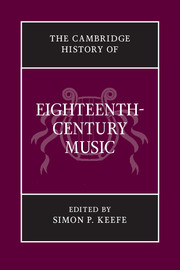Book contents
- Frontmatter
- PRELUDE
- PART I MUSIC FOR THE CHURCH
- 2 Catholic church music in Italy, and the Spanish and Portuguese Empires
- 3 Catholic sacred music in Austria
- 4 Catholic church music in France
- 5 Lutheran church music
- 6 Protestant church music in England and America
- INTERLUDE
- PART II MUSIC FOR THE THEATRE
- INTERLUDE
- PART III MUSIC FOR THE SALON AND CONCERT ROOM
- POSTLUDE
- Appendix I Chronology
- Appendix II Institutions in major European cities
- Appendix III Personalia
- Index
- References
4 - Catholic church music in France
from PART I - MUSIC FOR THE CHURCH
Published online by Cambridge University Press: 28 March 2011
- Frontmatter
- PRELUDE
- PART I MUSIC FOR THE CHURCH
- 2 Catholic church music in Italy, and the Spanish and Portuguese Empires
- 3 Catholic sacred music in Austria
- 4 Catholic church music in France
- 5 Lutheran church music
- 6 Protestant church music in England and America
- INTERLUDE
- PART II MUSIC FOR THE THEATRE
- INTERLUDE
- PART III MUSIC FOR THE SALON AND CONCERT ROOM
- POSTLUDE
- Appendix I Chronology
- Appendix II Institutions in major European cities
- Appendix III Personalia
- Index
- References
Summary
From the time of Francis I and the Concordat of Bologna (1516) onwards, the Church of France continuously defended its independence from the Holy See, notably by reducing papal interferences in temporal matters. Thanks to his Declaration of the Clergy of France (1682), in which the privileges of the Gallican Church were officially codified, Jacques Benigne Bossuet (1627–1704) succeeded in widening the prerogatives of the French king, and even managed to protect him against excommunication. But the Gallican Church intended by Louis XIV did not survive the revolutionary storm, being completely destroyed by the Civil Constitution of the Clergy in July 1790. Two years later (21 September 1792) the Musique of the Chapelle Royale, reorganized in 1683, was suppressed alongside the abolishment of the Absolute Monarchy. Between 1682–3 and 1790–2 French religious music underwent profound changes, while remaining firmly anchored in established traditions.
In matters of fashion and taste, the Court of Versailles, and then Paris, set the requisite tone and attracted the best musicians. Numerous provincial maîtres de musique, whose duties included composing and conducting motets as well as training pueri chori (boy choristers), were vicariants (itinerant musicians) who criss-crossed the country to secure a position at a major maîtrise (choir school). From there, some even tried to reach the capital in order to make a name for themselves at the Concert Spirituel (where motets were regularly performed), and in the case of the most gifted to enter the Chapelle Royale.
- Type
- Chapter
- Information
- The Cambridge History of Eighteenth-Century Music , pp. 113 - 126Publisher: Cambridge University PressPrint publication year: 2009
References
- 3
- Cited by



